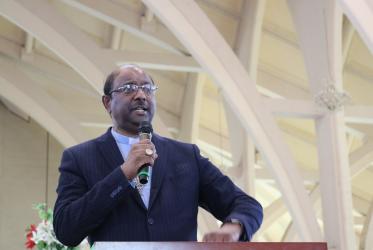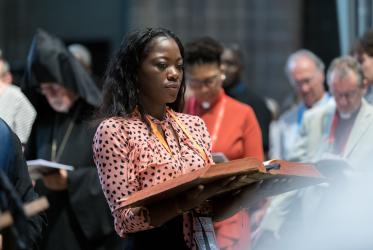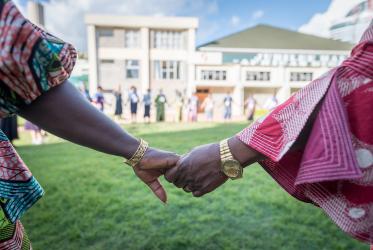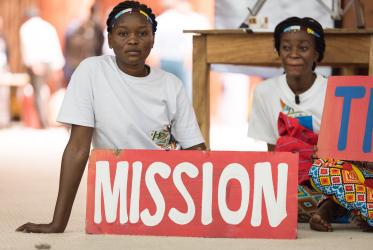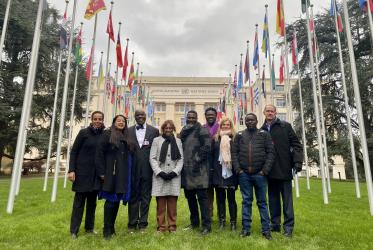Revd Christoph Anders, Member of the Commission on World Mission and Evangelism, Director of the Evangelisches Missionswerk
Moderator, dear Arusha-Participants, sisters and brothers,
It is my privilege and honour to speak in this plenary. I bring greetings from churches and mission organizations in Germany, such as EKD and EMW.
In this important gathering we come together from all regions of this world: East, South, West and North. We come with high expectations since in the history of ecumenical mission WMCs have often set the course for future debates, and I am convinced that this meeting in Arusha will prove to be very important for the global mission movement.
Therefore I wish to mention four points:
1 Discipleship in secularized contexts
In my country the waves of the Reformation Jubilee subsided. The multi-vocal reality of Reformation as a “World Citizen” and the ongoing relevance of its basic insights have been studied. The importance of education and formation for the global church was discussed in the Twin-Consultation about Reformation, Education and Transformation. There was a growing understanding of challenges and blessings for discipleship in European churches, marked by processes of secularization. We noted, however, that similar phenomena can be observed in regions outside the “Global North”. In some corners of the worldwide mission movement there seem to be rather critical perceptions of Secularization. For some the visible results seem to be a failure of churches’ ministry and mission that is understood by them as a bulwark of resistance. There are challenges for churches and Christians as followers of Jesus in highly secularized contexts. But by God’s grace true discipleship was, is and will be possible in the churches of our region – and like in any other province of World Christianity it is “costly”, using a phrase of Bonhoeffer. We have to accept new forms of committed faith practices defined by individuals outside the churches maybe as examples of a possibly transforming discipleship. Churches, even declining in numbers, want to stay close to the majority of people in their sufferings and hopes, but they also try to be present in the public sphere willing to contribute to meaningful transformations of their societies. Clear standpoints are needed, but in doing so Christians have to respect plurality as a given just as the irreducible diversity of world views and religious mind sets. This is the context, not the opponent of our mission and discipleship. So we wish to understand deeper in how far these experiences are relevant not only for churches in Europe but in other regions also.
2 Discipleship and ways of Peace and Justice
The difficult situations refugees and migrants face are discussed worldwide. In some European countries this has turned out to be crucial for a peaceful coexistence and debates are often linked with the fact that the majority of refugees do not share Christian faith. Religious polarisation and hostility are disturbing trends. Transforming discipleship needs to include the ministry of reconciliation and old questions gain new urgency: What is the place for Mission in the Dialogue with people of other faith? Can discipleship be Christ-oriented and yet open for crossing religious borders in joined action and spirituality for the fullness of life? In many countries churches are confronted with growing tendencies of populism. Religions are often misused in such contexts and as a result mainstream opinions in our societies tend to consider religions as a source for militancy rather than a contribution to peace. Here our witness needs to be committed to the struggle for freedom of religion and belief for all and we join the prayer: “God of life, lead us to Justice and Peace”!
3 Discipleship as a call for unity
A shared understanding of a Spirit moved and christ-centered discipleship could make this Conference a further encouraging step on the way towards a growing convergence between ecumenically oriented and evangelically grounded mission movements. In the worldwide reception processes of the ecumenical documents “Christian witness in a multi-religious world” and TTL we have experienced hopeful signs. For an ecumenical and missional presence of churches it is of high importance that this meeting can strengthen the cooperation with the Roman Catholic Church and the Pentecostal movement. Since these are central tasks of every WMC: To understand deeper the diversity of Christian witness, to stand up against competition and fragmentation, to empower the fellowship in transforming discipleship and to develop perspectives for a growing unity in Church and mission.
4 Biblical Notion
During our meeting we certainly will discuss many aspects such as margins and centres, Global North and Global South, World Christianity. I would like to close with Luke 13, 29. Jesus tells us: “And they shall come from the east, and from the west, and from the north, and from the south, and shall recline at the table of the kingdom of God”. At the end of the times there is the call of God’s Kingdom to all the people. And they start to move on a very special pilgrimage because they are called to be part of a great feast, a divine banquette - a beautiful vision, TTL is also closing with. Sitting at God’s table there will be ample time, no list of agenda items but a perfect mutual understanding. Yet here in Arusha the time is limited, but let’s pray that our meeting might become a humble foretaste of this eschatological banquette.
Let’s sit together at our tables full of joy and tell discipleship-stories, listen to each other and discuss different opinions. We will learn about the Signs of the Spirit in different regions of the world, sing and praise the Lord. Then, empowered by each other and God’s Spirit we may go back from Arusha to our countries as true Disciples: serving the needs of the people, transforming our societies and proclaiming the Glory of the Triune God.

